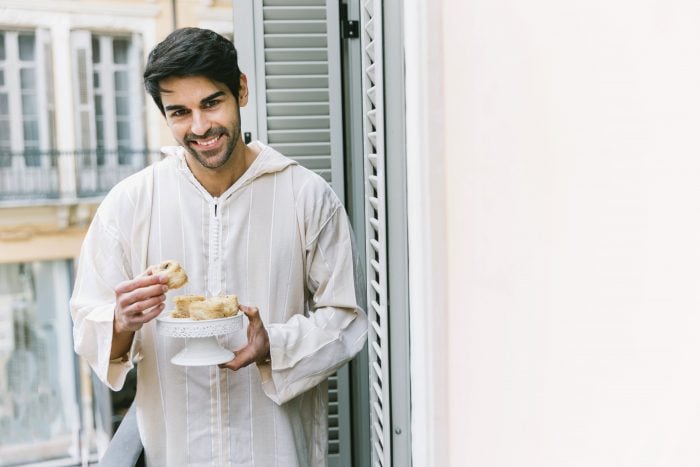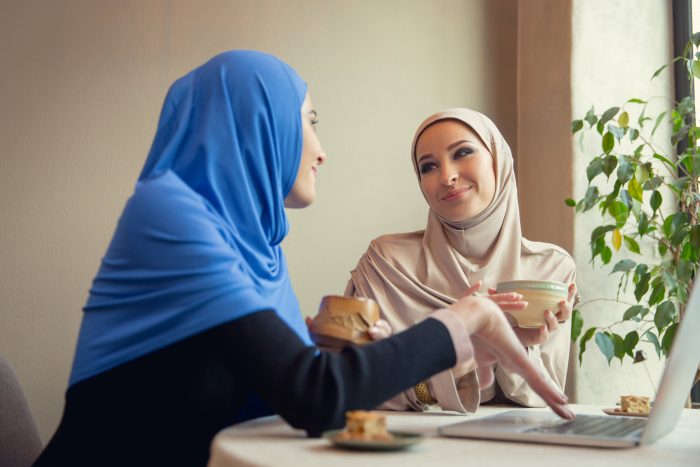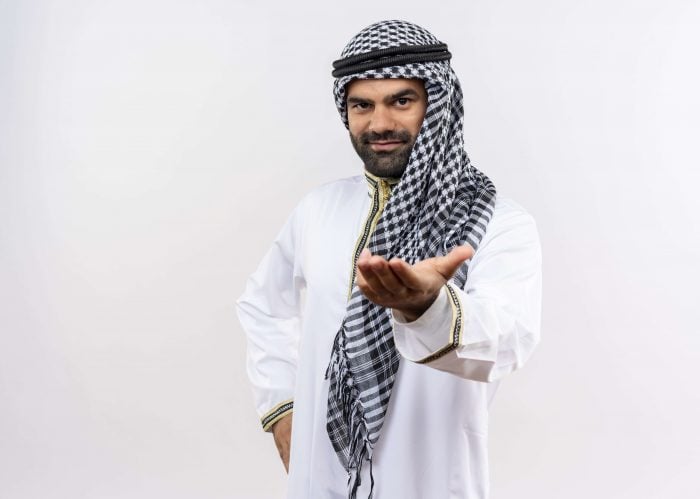22 Arabic Greetings to Awe Your Friends [With Examples]
Essential Arabic Greetings
- السلام عليكم (as-salām ʿalaykum) – Peace be upon you
- وعليكم السلام (wa ʿalaykum as-salām) – And peace be upon you
- مرحبا (marḥaban) — Hello
- أهلا – (ʿahlan) — Hi
- أهلا وسهلا (ʿahlan wa-sahlan) — How do you do?
- صباح الخير (ṣabāḥ ul-ḫayr) — Good morning!
- مساء الخير (masāʾ ul-ḫayr) — Good afternoon/evening!
- كيف الحال؟ (kayfal-ḥāl?) — How is everything?
Arabic greetings are expressions that native speakers use a dozen times every day without hesitation. However, if you don’t study all the different options out there and their cultural meaning, they may leave learners tongue-tied and terrified of saying the wrong thing.
Saying “good morning” or “hello” in Arabic might seem like a piece of cake, but slapping Arabic greetings into English contexts is likely to bring you more problems than new friendships.
So, if you’ve ever wondered how to say “hello” in Arabic but also want to learn about the cultural nuances embedded in Arabic greetings, we’ve got you covered.
Read the guide below to learn all about the varied and fascinating ways of greeting people in Standard Arabic.
Table of Contents
- Peace Be Upon You
- How to Say Hello in Arabic
- Arabic Good Morning
- Good Afternoon and Good Evening
- Showing Interest in Arabic
- How to Succeed at Small Talk in Arabic
- The Bittersweet Feeling of Goodbye
Peace Be Upon You
السلام عليكم (as-salām ʿalaykum)
There is a reason this greeting has a special spot at the beginning of the list. “Peace be upon you” is used by Muslims of different nationalities as a respectful way of greeting each other.
If you’re not a Muslim, however, you don’t need to worry about offending people by saying this phrase. On the contrary, it goes to show that you’ve made the effort to learn about their culture, which makes it the best way of saying hello in Arabic.
On the other hand, if a person says this to you, don’t hyperventilate. Just reply وعليكم السلام (wa ʿalaykum as-salām), which means “And peace be upon you,” and you will have gained their respect.
How to Say Hello in Arabic
As you might realise, speakers don’t really use Standard Arabic for casual, everyday conversations. This means that there aren’t as many slangy morning greetings in Arabic as there are in English.
However, there are a couple of informal ways of saying hello in Arabic that you need to learn if you want to avoid excessive formality. Let’s take a look:
مرحبا (marḥaban) — Hello
أهلا – (ʿahlan) — Hi
أهلا وسهلا (ʿahlan wa-sahlan)* — How do you do?
These three are less official-sounding than “Peace be upon you.”
*أهلا وسهلا (ʿahlan wa-sahlan) literally translates to “Family and good circumstances.” It’s an abbreviated version of an ancient Arabic welcoming greeting that has survived until today.
Arabic Good Morning
Like English, Arabic has specific greetings for every time of day.
So, is there an Arabic “good morning?” Of course there is. In fact, there are at least three different morning greetings you can use to greet people before noon.
صباح الخير (ṣabāḥ ul-ḫayr) — Good morning!
If you speak first, use the phrase above. You will very usually hear the response:
صباح النور (ṣabāḥ an-nūr) — A light morning! which is a different Arabic good morning greeting.
The key words in these expressions are:
صباح (sabaah) — morning
خير (ḫayr) — good
نور (nūr) — light
This means that you’re literally saying “A good morning!” and getting “A light morning!” as a response (Isn’t that just beautiful?).
Finally, there is الخليج التجاري (sah el nom). This is one of the cheekiest greetings in Arabic. Similar to “wakey, wakey,” it’s the perfect Arabic “good morning” phrase to use with latecomers, perpetually sleepy classmates and those caught asleep in the office. Said in a sing-songy tone, it is advisable to use this one only with people around your inner circle.
Good Afternoon and Good Evening
Now that we know how to say good morning, we should continue with the next time-oriented Arabic greeting, right?
Well, we’re up for a shock. Although Arabic greetings are rich and varied, Arabic culture doesn’t really have an expression for “good afternoon.” You might find an entry for this greeting in some textbooks, but you will see that it is, in fact, the same as “good evening.”
Any time after noon, you’ll use this phrase:
مساء الخير (masāʾ ul-ḫayr) — Good afternoon/evening!
You may have noticed that the pattern is the same as the phrase for “good morning.” We are using “ḫayr,” which means “good,” and “masā,” which means “evening.”
Arabic greetings are not so hard after all, are they?
By the way, the two Arabic greetings above have a perfect level of formality for professional communications. So, if you work with native speakers, use these expressions to greet at the beginning and the end of the working day and watch those smiles appear all around. (Make sure you don’t sound overexcited, though. If you’re too loud, you might just scare them!)
Showing Interest in Arabic
“Good morning” is a great place to start, but if you really want to impress native speakers, you’ll need to be able to have a short conversation.
كيف الحال؟ (kayfal-ḥāl?) — How is everything?
A nearly perfect equivalent to “How are things?,” كيف الحال؟ (kayfal-ḥāl?) is the perfect thing to say after exchanging hello or good morning. If you want to make it a bit more personal, you can add the -uk suffix (if you’re addressing a man) or the -ik suffix (if you’re addressing a woman).
Responses to Arabic greetings of the “how are you” type may vary depending on the context and register, but the most common options are:
بخير، شكرا (biḫayr, šukran) — Fine, thanks
مشغول (mašġūl) — Busy
This one means that the person is not willing to have a chat at the moment, so you may want to find someone else to impress them with your speaking skills!
و أنت؟ (wa anta?) — And you? [masculine]
When posed to a woman, this is written identically, but pronounced like this:
و أنت؟ (wa anti?) — And you? [feminine]
Remember that politeness is much appreciated in Arabic culture, so it won’t hurt to add a شكرا (šukran), meaning “thank you” after your reply.
You should also bear in mind that, like most Arabic greetings, these questions are exchanged as mere pleasantries and don’t expect a full answer, so avoid replying to “And you?” with a detailed account of your feelings!
How to Succeed at Small Talk in Arabic
Imagine you find yourself in a situation where you have to fill a very awkward silence. If you’ve ever been on a long elevator ride with a stranger, you know what kind of silence we’re talking about.
One of the best things to say after a good morning or hello in Arabic is “How is your family?” Families make one of the best small talk topics, but be warned: while it’s perfectly fine to ask general questions, it’s advisable to avoid specific questions that might sound nosy or too forward. Things like “What does your husband do?” or “Does your son have a girlfriend?” might come off as rude and lead to an even more awkward silence.
So, if you want to engage in small talk after exchanging a few harmless Arabic greetings, just go with:
كيف حال عائلتك ؟ (kayfa ḥalu ʿāʾilatuk?) — How is your family?
The funny thing is that your interlocutor is very likely to actually give you a lot of details about their family, but that’s okay. As long as you’re not the first to bring it up, you’re completely safe!
Another safe topic to go into after boasting your knowledge of Arabic greetings is the weather.Go for any of these phrases:
الجو جميل اليوم (al-ǧawwu ǧamīl al-yawm) — The weather is nice today.
هل تظن أنها ستمطر؟ (hal taẓunnu ʾannahā satumṭir?) — Do you reckon it will rain?
إنه بارد جدا (‘iinah barid jidana) — It’s so cold!
The Bittersweet Feeling of Goodbye
No guide on Arabic greetings would be complete without tips on how to say goodbye.
The good news is that the word “Bye,” like many English terms, has made its way into day-to-day Arabic, so you can safely use it both on the phone and in person.
باي (bāi) — Bye
However, the most polite way to end a conversation is by saying:
مَع السَلامة (maʿ al-salāmah) — With peace.
Another great option is to say the slightly more informal greeting
إلى اللِقاء (ʾilā al-liqāʾ) — Until we meet again!
Now that you’ve mastered Arabic morning greetings and you’ve even learned how to do small talk, what’s next?
While knowing how to say hello in Arabic is great, if you really want to wow native speakers, you’ll need to dig deeper into the language.
Fortunately, you’ve clicked on the right page. On our website, you will find personalized Arabic courses taught by native Arabic teachers who’ll take you beyond Arabic greetings into the fascinating challenges of becoming a fluent Arabic speaker. Is there anything we have missed out on? Send us a message now and we’ll promptly answer all your questions.




